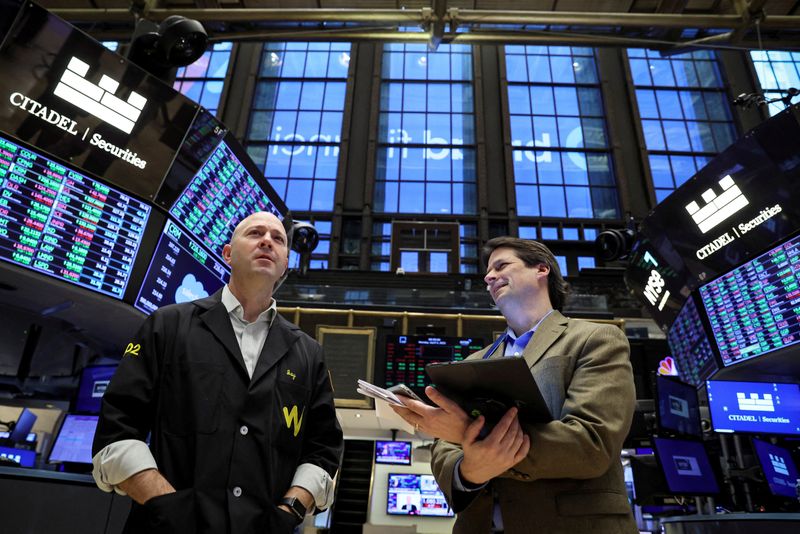Investing.com -- U.S. inflation data for June will be in focus with the Federal Reserve all but certain to hike rates again later this month. Earnings season kicks off with results from big banks, while data out of China is expected to point to ongoing economic weakness. The Bank of Canada is expected to hike rates again and oil prices could be poised to break out to the upside.
- Inflation numbers
Data on Wednesday is expected to show that the consumer price index rose at an annual rate of 3.1% in June, which would be the slowest increase since March 2021. Core CPI, which strips out volatile food and fuel prices, is expected to increase at an annual rate of 5%, moderating from 5.3% in May but still more than double the Fed’s 2% target.
The data comes after Friday’s June jobs report all but ensured the Fed will resume rate hikes later this month.
The U.S. economy added the fewest jobs in two-and-a-half years in June, but persistently strong wage growth indicated that labor market conditions remain tight.
Investors will also get the chance to hear from several Fed officials during the week with Minneapolis Fed president Neel Kashkari, Cleveland Fed President Loretta Mester, San Francisco Fed president Mary Daly and Fed Governor Christopher Waller all making appearances.
The Fed is also to publish its Beige Book on Wednesday.
- Earnings season gets underway
Big banks will start reporting second-quarter results on Friday after breezing through the Fed’s stress tests late last month, paving the way for them to issue share buybacks and dividends.
The Fed's annual health check indicated that large lenders have enough capital to weather a severe economic downturn, but now it’s time for earnings.
JPMorgan Chase (NYSE:JPM), Citigroup (NYSE:C) and Wells Fargo (NYSE:WFC) are all scheduled to report second-quarter earnings on Friday with analysts expecting results to be weighed down by sluggish dealmaking and trading revenue while a dearth of investment-banking activity has prompted banks to lay off thousands of employees.
After the turmoil in the banking sector earlier this year analysts will also be focusing on what banks have to say about the outlook for lending and how much they set aside in rainy-day funds to cushion losses from souring loans.
- China
China is to release inflation and trade data in the coming week which is likely to underline that the post-COVID recovery in the world’s second-largest economy is faltering amid increasing deflationary pressures, high youth unemployment and lackluster foreign demand.
Monday’s inflation data for June is expected to show that annual inflation held steady at 0.2% while Thursday’s June trade figures are expected to show that exports fell again.
Beijing is embroiled in a hi-tech trade war with Washington while grappling with a sputtering economy.
After months of tightening of restrictions by the U.S. and key allies on chip-related imports, Beijing has hit back with curbs on chip-making metal exports. Washington has been mulling curbing Chinese companies' access to cloud-computing services.
- Central bank decisions
The Bank of Canada is to hold its latest policy meeting on Wednesday with analysts expecting another 25-basis point rate hike after Friday’s far stronger-than-expected jobs report indicated that the economy remains resilient.
The BoC raised rates to a 22-year peak of 4.75% last month amid concerns over persistent inflation after leaving them on hold since their last hike in January.
The BoC is also to unveil new economic forecasts on Wednesday.
The economy has remained robust despite nine rate increases totaling 450 basis points since March of last year.
Elsewhere, the Reserve Bank of New Zealand is set to keep rates on hold at its latest meeting on Wednesday, having already called time on its tightening cycle.
- Oil prices
Oil prices closed at the highest level in nine weeks on Friday with both Brent and U.S. West Texas Intermediate crude (WTI) gaining around 5% for the week.
Prices were boosted as supply concerns and technical buying offset worries that further rate hikes could slow economic growth and weigh on the demand outlook for oil.
"We're knocking on the door of a major breakout to the upside. I think you're seeing some short covering here today ... because a lot of people have been betting on the short side, Phil Flynn, an analyst at Price Futures Group told Reuters.
Top oil exporters Saudi Arabia and Russia announced fresh output cuts last week bringing total reductions by OPEC+, the Organization of the Petroleum Exporting Countries (OPEC) and its allies, to around 5 million barrels per day (bpd), or about 5% of global oil demand.
Oil prices were also supported by the weaker dollar, which hit a two-week low after the strong U.S. jobs report underpinned expectations for further Fed rate hikes.
A weaker dollar makes crude cheaper for holders of other currencies, which could boost oil demand.
--Reuters contributed to this report
